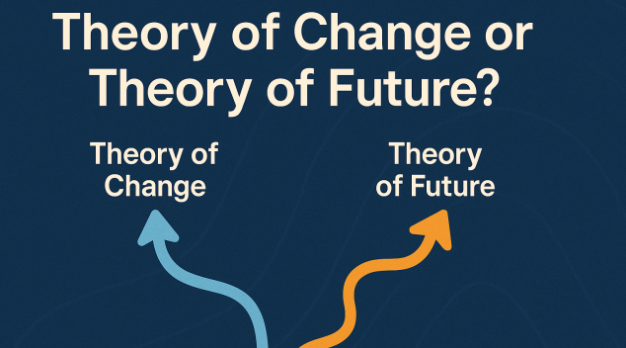Leonardo Cunha
Liderança | Empreendedorismo | Gestão | Planeamento | Estratégia | Escrita para Financiamento | Especialista em financiamento para desenvolvimento | Orador internacional
2 de agosto de 2025
In the world of nonprofits, international cooperation, and social innovation, the Theory of Change (ToC) has long been a dominant framework. It is often treated as a cornerstone of program design, monitoring, and evaluation. As a tool, it encourages us to articulate clear assumptions, define expected outcomes, and draw logical causal pathways from inputs to long-term impact. But what if, as Eliana Summer-Galai provocatively suggests in her article “We’re Asking the Wrong Questions—and Designing the Wrong Futures,” this focus on linear logic is insufficient for the world we are trying to change?
Published on the Leap of Futures platform, Eliana Summer-Galai piece challenges us to move beyond ToC as a mechanism of accountability and planning. She invites us to engage with a Theory of Future—a conceptual framework that embraces complexity, emergence, imagination, and the unknown. Her critique resonates with a growing body of literature that questions linear, deterministic approaches to development, particularly when addressing systemic challenges such as climate change, inequality, and digital transformation.
While the Theory of Change asks: “What must happen for X to lead to Y?”—the Theory of Future poses deeper, more generative questions: “What future do we want to bring into being?” and “Who gets to imagine, design, and narrate that future?” This shift is not simply semantic. It represents a paradigmatic departure from reactive change management to proactive future-shaping.
The implications of this shift are profound. A Theory of Future implies that we cannot rely solely on evidence from the past to predict or plan for the future. It encourages scenario-building, collective visioning, and the use of speculative design to expand our understanding of what is possible. In doing so, it challenges traditional notions of “impact” as something to be measured solely by indicators, logframes, and KPIs. Instead, it calls for participatory and emancipatory models of change, particularly in communities that have historically been excluded from decision-making and agenda-setting.
Eliana Summer-Galai writes: “The real work of transformation is not only about proving what works. It’s about imagining what could be.” This assertion aligns with foresight methodologies in futures studies, which advocate for anticipatory governance and the democratization of future-making (Miller, 2018; Poli, 2017). In this light, a Theory of Future becomes a critical tool for decolonizing development and social innovation. It centres voices from the margins, acknowledges uncertainty as a productive force, and resists the impulse to reduce change to neat logical chains.
For nonprofits, donors, and development practitioners, adopting a Theory of Future perspective means investing not just in solutions, but in spaces for imagination. It requires us to engage with artists, storytellers, youth, Indigenous communities, and technologists—not only as implementers of programs but as co-creators of future worlds. It also means shifting from a culture of control to one of trust, from short-term project cycles to long-term ecosystem thinking.
In practical terms, this might involve transforming planning workshops into future labs, integrating speculative fiction into policy dialogues, or using AI and digital media to visualize alternative futures. While Theory of Change helps us explain how we believe change will happen, a Theory of Future allows us to ask whether that change is truly worth pursuing—and for whom.
As the world faces intersecting crises and unprecedented opportunities, Summer-Galai’s call to reframe our models is not only timely, it is essential. In her words, “We must design for possibility, not just probability.” The Theory of Change has served us well as a tool of accountability. But to meet the challenges of the 21st century, we need tools of imagination, courage, and collective dreaming. Perhaps it’s time we stopped asking what will change, and started asking what future we dare to build.
References:
Miller, R. (2018). Transforming the Future: Anticipation in the 21st Century. Routledge.
Poli, R. (2017). Introduction to Anticipation Studies. Springer.
Summer-Galai, E. (2024, July 18). We’re Asking the Wrong Questions—and Designing the Wrong Futures. Leap of Futures. https://leapofutures.substack.com/p/were-asking-the-wrong-questions-and
Weiss, C. H. (1995). Nothing as practical as good theory: Exploring theory-based evaluation for comprehensive community initiatives for children and families. In J. Connell et al. (Eds.), New approaches to evaluating community initiatives: Concepts, methods, and contexts (pp. 65–92). Aspen Institute.
Vogel, I. (2012). Review of the use of “Theory of Change” in international development. UK Department for International Development.


